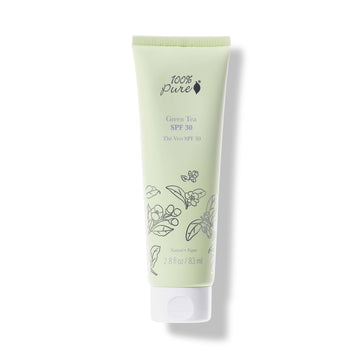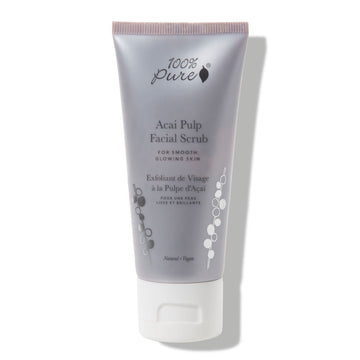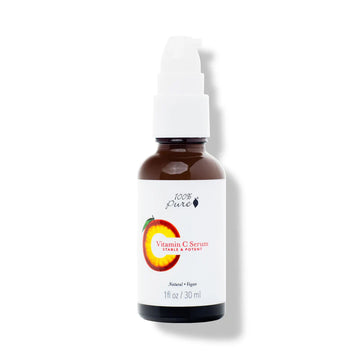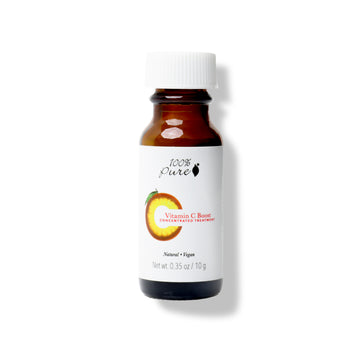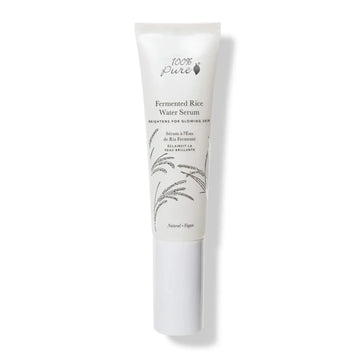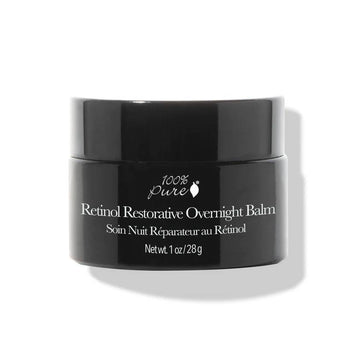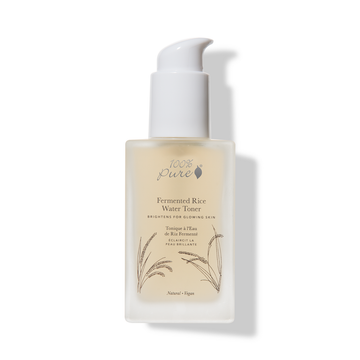Exploring melasma treatments for a balanced complexion
Written by: 100% PURE ®
There’s hyperpigmentation, and then there’s melasma. While hyperpigmentation can be caused by anything from acne scars to eczema, melasma is far more distinct. It’s more common in women, and is often caused by hormones, making it difficult to treat.
Fortunately, there is no shortage of options in the treatment of melasma! Many of them are products you can use from home – but first, let’s answer the question: what is melasma?
Melasma is a type of hyperpigmentation, commonly identified as dark spots or dark skin patches. These symptoms occur when our pigment-producing cells are triggered to become bigger and more productive, leading to dark spots and discoloration all over the skin.
Melasma can be caused in women by a number of factors, one of the most prevalent being hormonal changes. In fact, melasma is often referred to as ‘pregnancy mask’ because it’s known to affect pregnant women as their hormone levels change. But that’s not the only determining factor.
Melasma can also be caused by UV radiation and heat exposure. It’s been shown in studies that heat causes blood vessels to dilate and expand, which can potentially spike pigment production.
Preventing the occurrence of melasma for those prone to it can be difficult, but not always impossible.
The first tip for preventing melasma, naturally, is to avoid prolonged exposure to direct sunlight or extreme heat. But if your lifestyle includes hot baths, outdoor exercise, or spending lots of time near the oven, this step is easier said than done!
Still, the key is to avoid sun and heat when possible. So if one of the best parts of your day is an outdoor run or soak in the tub, there’s no need to give it up! Just focus on ways to curb the chances of triggering melanin overproduction during these times.
Sun Protection
The best way to do this is by making sure you’re wearing sunscreen whenever outdoors. This step is crucial no matter your skin type, as the effects on the sun are especially damaging to skin. You can also wear protective gear like sun hats and sunglasses.
Exfoliation
Exfoliating is also great for preventing melasma as it helps to smooth skin, remove bumps, and minimize dark spots by gently sloughing off dead skin cells. You can use a physical exfoliant (like a facial scrub), or you can use a chemical exfoliant. When choosing the latter, stick with products containing AHAs like glycolic acidhttps://www.100percentpure.com/blogs/feed/a-quick-reminder-on-why-everyone-loves-vitamin-c, which are known to help penetrate the skin and brighten complexion.
Antioxidants
Similar to retinol, vitamin C helps encourage skin turnover, and it’s been proven to impede dark spots and protect against UV damage. If you use a vitamin C product, make sure that it’s one that comes in a stabilized form, such as our lightweight Vitamin C Serum or the concentrated Vitamin C Boost.
Natural Brighteners
Other gently-brightening ingredients can help with melasma, too. One of our favorites is rice water, which was shown in a 2013 study to help diminish sun damage and signs of aging. Our Fermented Rice Water Serum takes this special ingredient and combines it with plant enzymes to help brighten, hydrate, and soften skin.
Review Medications
Surprisingly, one of the common causes of melasma can be birth control. It’s been theorized that because hormonal changes and imbalances can lead to melasma, birth control may play a major role in making it worse. If you suspect that there may be a correlation between your melasma and birth control, it’s a good idea to consult your primary care physician or dermatologist about an alternative contraceptive option.
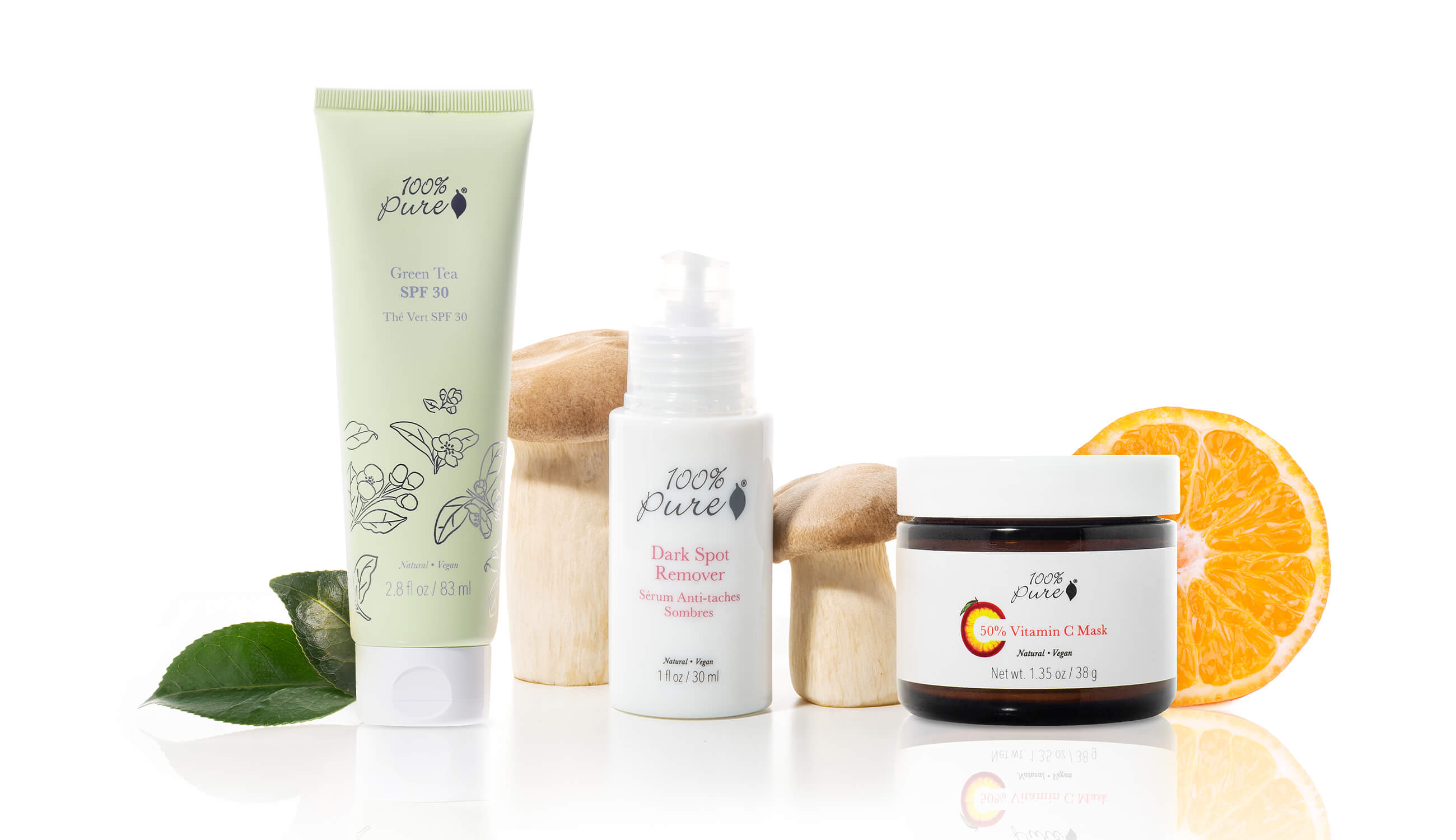
It’s one thing to prevent the onset of melasma, but what about melasma treatment? Luckily, most preventive measures can help melasma heal over time, but there are also more aggressive ways to tackle it once it’s arrived. For a more in-depth reference, we recommend taking a look at our Dark Spot Remover Breakdown, but here is a quickfire guide:
-
One of the most doable melasma treatments to try at home is adding antioxidants into your daily routine. Vitamin C is a great example, but others include epigallocatechin gallate, or EGCG, which is most commonly found in green tea. EGCG has been shown to help improve the appearance of skin by slowing free radical damage and soothing inflammation.
-
Bearberry extract is known to help brighten skin by soothing irritation with its high concentration of arbutin. That’s why it’s featured in our Dark Spot Remover, which also features skin brightening papaya and matsutake mushroom extracts.
-
Retinol is also helpful with encouraging skin cell turnover to help rejuvenate the skin, and it’s one of the key ingredients in our Restorative Overnight Balm. Depending on the level of melasma you have, a more concentrated form of retinol may be available by prescription. Keep in mind that more potent retinoids are not to be taken when pregnant, so this isn’t an option for women who are experiencing pregnancy-related melasma.
-
Kojic acid also helps fade the appearance of dark spots and scarring by blocking the amino acid tyrosine, which encourages the production of melanin. Kojic acid is naturally found in sake and certain fungi, like the matsutake and shiitake mushrooms. Shiitake is one of the key ingredients in our radiance-boosting Fermented Rice Water Toner.
Professional melasma treatments, such as chemical peels, are a potential option that should be discussed with your dermatologist.
Chemical peels made with melanogenesis-fighting ingredients help accelerate melasma treatment. They do this by removing dead skin cells from the surface without creating inflammation or rawness in the skin. Keep in mind that skin peels are never recommended for at-home use if you’re not licensed or trained, especially since it’s very easy to over-treat melasma.
You may be wondering: when do I see a professional for melasma treatment? Visiting a dermatologist is recommended when over-the-counter melasma products don’t seem to work, or when symptoms seem to be worsening or become unmanageable. Seeing a professional can also help rule out other causes of melasma.
In any case, make sure that you’re taking care of your skin through ingredients that work to rejuvenate the skin, and avoid exacerbating factors of melasma. While melasma means your body is doing its job to protect you from sun damage or other stressors, it’s all about finding a balance that leaves you with healthy, radiant skin.
We carefully hand-select products based on strict purity standards, and only recommend products we feel meet this criteria. 100% PURE™ may earn a small commission for products purchased through affiliate links.
The information in this article is for educational use, and not intended to substitute professional medical advice, diagnosis, or treatment and should not be used as such.


